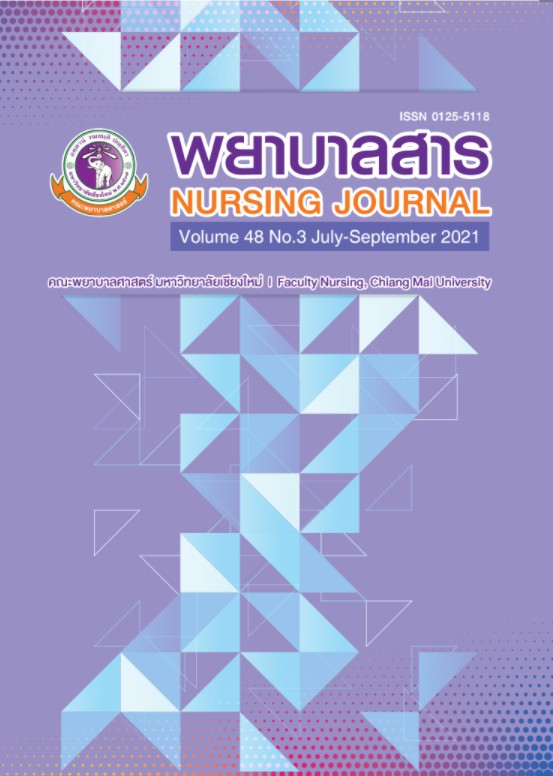Factors Related to Family Management in Families of Children with Recurrent Seizures
Keywords:
Family management, Children, Recurrent seizuresAbstract
Family management is important for children with recurrent seizures because it helps children to get proper care and to control the seizures. The objectives of this descriptive correlational research aimed to investigate family management in families of children with recurrent seizures, and explore the relationships between the education level of primary caregivers, the family income, and the social support with family management. The framework of the study is from Grey, Knafl, & McCorkle (2006) with a literature review. Purposive sampling was used to select 85 primary caregivers who took care of children aged 1 to 5 years old with recurrent seizures and had brought them to attend the out-patient departments at three tertiary hospitals from October 2017 to February 2018. The research instruments included the Primary Caregiver and Children’s Personal Information Questionnaire, the Family Management Measure, and The Social Support and Sources of Social Support for Caregiver Questionnaire. The data were analyzed using descriptive statistics including the Spearman rank correlation coefficient and Pearson’s correlation coefficient.
The results of the study revealed that:
- The overall scores for family management were at a moderate level with an average score of 132.96 (S.D. = 16.89). All dimensions of family management were at a moderate level including the child’s daily life, the condition management ability, the condition management effort, the family life difficulty, and the view of condition impact, with average scores of 12.41 (S.D. = 2.84), 43.38 (S.D. = 5.61), 14.50 (S.D. = 3.10), 35.05 (S.D. = 7.57), and 29.18 (S.D. = 5.23), respectively.
- Social support had a statistically significant positive correlation with family management at a high level (r = .50, p < 0.01).
The results of this study provided basic information about family management of children with recurrent seizures. It may be used as a guideline to provide more effective family management.
References
Anukunwathaka, N., Sangsupawanitch, P.,& Parinyasutinun, U. (2017). Factors predicting seizure prevention practices in children among caregivers. Nursing Journal, 44(4), 1-12. (in Thai)
Barrera, M., Glasgow, R. E., McKay, H. G., Boles, S. M., & Feil, E. G. (2002). Do internet-based support interventions change perceptions of social support?: An experimental trial of approaches for supporting diabetes self-management. American Journal of Community Psychology, 30(5), 637-654. doi: 10.1023/A:1016369114780.
Camfield, P., & Camfield, C. (2015). Incidence, prevalence and aetiology of seizures and epilepsy in
children. Epileptic Disorders, 17(2), 117-123.
Chung, B., Wat, L. C., & Wong, V. (2006). Febrile seizures in southern Chinese children: Incidence
and recurrence. Pediatric Neurology, 34(2), 121-126.
Chusri, O., Deoisres, W., & Riper, M. V. (2016). The style of management in families having a child with thalassemia. SDU Research Journal Sciences and Technology, 9(3), 111-125.
Fagnano, M., Halterman, J. S., Conn, K. M., & Shone, L. P. (2012). Health literacy and sources of health information for caregivers of urban children with asthma. Clinical pediatrics, 51(3), 267-273.
Grey, M., Knafl, K. A., & McCorkle, R. (2006). A framework for the study of self-and family management of chronic conditions. Nursing outlook, 54(5), 278-286.
Hauser, W. A. (2016). Epidemiology of epilepsy in children. In D. R. Nordli, J. M. Pellock, R. Sankar, & J. W. Wheless (Eds.), Pellock's pediatric epilepsy: Diagnosis and therapy (pp.177-206). New Yok: Springer Publishing
Knafl, K. A., Deatrick, J. A., & Havill, N. L. (2012). Continued development of the family management style framework. Journal of Family Nursing, 18(1), 11-34. doi: 10.1177/1074840711427294.
Kodchana, J. (2009). Effect of social support groups on the parenting potential of preschool children and stress of grandmother in Phu Wiang District, Loei Province (Master’s thesis). Graduate School, Khon Kaen University, Thailand. (in Thai)
Maia, C., Moreira, A. R., Lopes, T., & Martins, C. (2017). Risk of recurrence after a first unprovoked seizure in children. Journal de Pediatria, 93(3), 281-286. doi: 10.1016/j.jped.2016.07.001.
Miller, T. A., & DiMatteo, M. R. (2013). Importance of family/social support and impact on adherence to diabetic therapy. Diabetes, Metabolic Syndrome and Obesity: T argets and therapy, 6, 421.
Nordli, D. R., Pellock, J. M., Sankar, R., & Wheless, J. W. (Eds.). (2012). Pellock's pediatric epilepsy: Diagnosis and therapy. New York: Springer Publishing.
Polit, D.F. & Beck. C., T. (2010). Statistics and data analysis for nursing research (2nd ed.). New Jersey: Pearson Education.
Rabbani, A., & Alexander, G. C. (2009). The association between family structure, reports of illness and health care demand for children: Evidence from rural Bangladesh. Journal of Biosocial Science, 41(5), 645-656.
Reangrong, B. (2012). Social development: Preschool age. (in Thai) Retrieved From http://taamkru.com/th.
Sarhan, A. A., Ayouty, M. M., Elsharkawy, A. A., & Elmagid, D. S. A. (2015). Neurodevelopmental and neurobehavioral aspects of childhood epilepsy. Benha Medical Journal, 32(1), 13.
Soithongdee, S. (2009). Presentation of motherhood Ideology in advertising discourse. Bangkok:Chulalongkorn University. (in Thai)
Thamnae, P., Kongsaktrakul, C., & Patoomwan, A. (2011). Predictive factors for adaptation among caregivers of children with epilepsy. Ramathibodi Nursing Journal, 17(2), 218-231.
Tatiyatrirong, T., Punthmatharith, B., & Wiroonpanich, W. (2016). The influence of selected factors on quality of life of children with epilepsy perceived by caregivers. Songklanagarind Journal of Nursing, 36(3), 94-110. (in Thai)
Tosawat, J. (2012). Incidence and factors related to develop repeated febrile convulsion in children in Inburi hospital. Journal of the Third National Defense of Thailand, 2(1), 49-60. (in Thai)
World Health Organization[WHO]. (2016). Epilepsy: Key fact. Retrieved from http://www.who. int/ mediacentre/factsheets/fs999/en/.
Wu, Y. P., Follansbee Junger, K., Rausch, J., & Modi, A. (2014). Parent and family stress factors
predict health related quality in pediatric patients with new onset epilepsy. Epilepsia, 55(6), 866-877.
Downloads
Published
How to Cite
Issue
Section
License
บทความที่ได้รับการตีพิมพ์เป็นลิขสิทธิ์ของวารสารพยาบาลสาร
ข้อความที่ปรากฏในบทความแต่ละเรื่องในวารสารวิชาการเล่มนี้เป็นความคิดเห็นส่วนตัวของผู้เขียนแต่ละท่านไม่เกี่ยวข้องกับมหาวิทยาลัยเชียงใหม่ และคณาจารย์ท่านอื่นๆในมหาวิทยาลัยฯ แต่อย่างใด ความรับผิดชอบองค์ประกอบทั้งหมดของบทความแต่ละเรื่องเป็นของผู้เขียนแต่ละท่าน หากมีความผิดพลาดใด ๆ ผู้เขียนแต่ละท่านจะรับผิดชอบบทความของตนเองแต่ผู้เดียว






